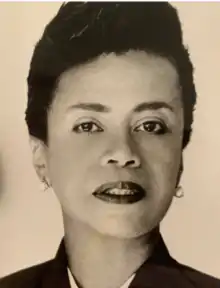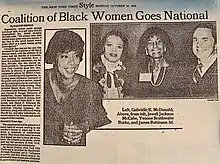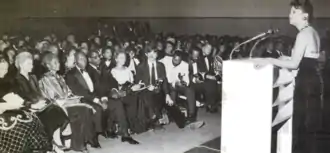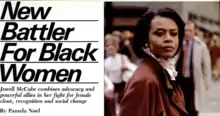Jewell Jackson McCabe
Jewell Jackson McCabe (born August 2, 1945) is an American feminist, business executive, and social and political activist. She was a leader of, and spokesperson for, the National Coalition of 100 Black Women's movement [1] [2] in the early 1970s in New York City and throughout the United States in the early 1980s into the 1990s, as founder of the organization which grew out of her New York City stewardship. In 1993 she became the first woman in 84 years to be in serious contention [3] for the presidency of the civil rights organizations NAACP. Distinguished as an activist McCabe collaborated with Angela Davis [4] NYTimes.com excerpt from NYTIMES OpEd "The coalition of black feminists led by Angela Davis and Jewell Jackson McCabe emphasized one of the many dangers inherent in this Million Man March [banning women]. They labeled the march's message that it is "time for men to step forward and women to step back" as an insult to 400 years of burden-sharing by black men and women."
Jewell Jackson McCabe | |
|---|---|
 Jewell in 1993 | |
| Born | Jewell Alyce Jackson August 2, 1945 Washington, D.C., U.S. |
| Education | The High School of Performing Arts |
| Alma mater | Bard College (BA) |
| Occupation |
|
| Spouse(s) | Frederick E. Ward
(m. 1964; div. 1975)Eugene L. McCabe
(m. 1975; div. 1984) |
| Partner(s) | Eugene L. McCabe (1967-1975) |
| Parents |
|
National Coalition of 100 Black Women

Founding President Jewell Jackson McCabe’s accomplishment. Established National Ideology, Identity and Scope of Programs. Conceptualized, organized and created a distinct contemporary public policy vehicle for and about African American and women of color. Building on the foundation and legacy of leadership achievement of black women - this refreshed approach to empowerment bridged the public and private sector to enable access and opportunity for contemporary Black Women. Institutional Development: Organized 7000 women in 35 States and the District of Columbia; Published Chapter Manual; Commissioned the first leadership poll on Black Women - Louis Harris Leadership Poll; and, commissioned Research Papers on the status of Black Women in Leadership, Economics, Health, Politics and the Family. Conducted the Aspen Institute Retreat “Inheriting the Legacy of Leadership” a Generational 20-year Plan; Launched Annual Chapter President’s Retreat; Cultivated Resources: Philanthropic, Corporate and High net worth individuals resources. Programs: Business Administration, Health and Public Policy role modeling [college] Career Explorations [High School Education & Jobs], Women In Partnership [Teen Pregnancy], Candace Award [Civil Rights – Non-Traditional/Diversified Recognition], Civil Institute for Women of Color [strategic alliances], Wealth Markets and Social Change [economic development] Strategic Communication: “Statement” quarterly newsletter.

The Candace Award presented annually at The Metropolitan Museum of Art NYC—1982 to 1992 — Hosted by Maya Angelou was crafted as a unique civil rights statement — honoring African American Women (and a few good-men) from a cross-section of disciplines in non-traditional roles. “Candace, queen of the Ethiopians” is mentioned in the Bible Acts of the Apostle... Philip meets “a eunuch of great authority” under her reign and converts him to Christianity (Acts 8:27-39). The Candace Award created, established on behalf of the National Coalition of 100 Black Women, Inc. by their founding President, Jewell Jackson McCabe.
Early life
Jewell Jackson was born in Washington, D.C. on August 2, 1945 to Harold "Hal" B. Jackson and Julia Hawkins-Jackson. Hal Jackson and his partner Percy E. Sutton started Inner City Broadcasting.[5] ICB began after the U.S. Federal Communications Commission ruled that there be an increase in black radio and television. ICB owned nearly twenty radio stations including WBLS-FM where Hal was a broadcaster. Hal was known as the "Godfather of Black Radio" and opened doors of opportunity for numerous others including being the first to play new artist Alicia Keys’ music. [6]
Julia, Jewell’s mother, was active with The Links, Incorporated, Urban League Guild, and Jack and Jill. Jewell’s earliest influences also came from her aunts. Her aunt Alice Cornish was an elementary school teacher in Washington, DC, the first to integrate the schools in that area, and Essie Goldwire was the first black graduate of the Boston Conservatory of Music.
Throughout her life, Jewell was encouraged to work hard and take nothing for granted. Her father once placed a copy of the New York Times in front of her, saying, "Until you see black people on the front page of this paper, we will not be free." This stuck with her, moving her to continue to set goals that were higher than anyone could have expected.
McCabe was drawn to the performing arts – specifically dance. She studied Russian form classical ballet and modern dance at the High School of Performing Arts in New York City. The school later became the model for the long running dance show Fame. McCabe was inspired by Katherine Dunham and performed routines using both Dunham and Martha Graham techniques.
After attending High School of Performing Arts, McCabe continued her dance studies at Bard College. However, McCabe left college in 1967 to marry Frederick Ward, an alumnus of Bard College who initially worked in advertising and later became a copywriter, advertiser and author.
Later she married US Marine Eugene L. McCabe, who later became president of North General Hospital in New York City. Ever an avid reader, he helped foster McCabe's desire to continue her work through advocacy. Eugene McCabe was the grandson of Polly McCabe, the founder of New Haven, Connecticut school for girls, and was also a great influence on McCabe's desire to stand up for women who did not, could not, or would not stand up for themselves. Though both marriages ended in divorce McCabe remains great friends with both men.
When asked why she retains Eugene McCabe's last name, McCabe states that it is her way of showing respect for those who nurtured her desire to learn and fed her insatiable appetite for knowledge. The first person to educate her and motivate her was her father and the second was Eugene L. McCabe.
Early career
The New York Times - Brozan, Nadine., feature article Coalition of 100 Black Women, “Determined to Foster Change”, Monday March 11th, 1974 “Jewell Jackson McCabe, demonstrated her leadership skill-set early on as chronicled the NYTimes in 1974. Prior to the national movement the Coalition of 100 Black Women’s strengths were shown as a determining force for black women; when delegates were being selected to represent the borough of Manhattan for the National Black Convention held in Gary Indiana, 1972 – “the male leaders told us we might get two or three spots”, Jewell said “through caucusing we… ended up with 17… six [from the coalition] in [what was] the delegation of 35. [and] for the second convention, held in Little Rock, Ark., in 1974 we [the coalition had] 9 Manhattan spots of the 38member delegation. [Jewell continued] “At the same time as we amassed delegate strength for the Gary, Ind. Convention… we were focusing on the registration of blacks for the 1972 [US National] election. Fifty [Coalition] members became certified as registrars... and we setup booths wherever we were likely to find blacks en masse.” [7]
Ebony (magazine), feature article, Jewell Jackson McCabe “Women to Watch”, August 1982.
Savvy Magazine - cover story, on Jewell Jackson McCabe’s persona, dynamic career trajectory, and fashionable dress, “Suited for the Fast Track: Savvy’s National Report on Style and Success”, March 1983.
New York Daily News Feature Story, profiling Jewell’s work ethic and ambitious itinerary “The many facets of Jewell McCabe” Friday July 8th, 1983 by Joyce White - … “Jewell Jackson McCabe moves at a lightning pace. Watch her—if you can catch her. We explore what keeps her moving at a dizzying pace - Jewell’s day had begun at 8a.m. at a meeting at The Metropolitan Museum of Art, followed by five appointments; squeezing-in 2 morning meetings the next day prior to catching a plane to Indianapolis, where she would meet with Mayor Richard Hatcher, host of a conference on black people in industry. And, the next day she would go to San Antonio, Tex. Where she had been invited by the National Organization for Women (NOW) to participate in a panel discussion on politics. The following day Jewell was scheduled to move on to Houston, Tex., where she will be talking to a local organization about pregnancy and black teenagers. Returning to New York City on Sunday in time for church, and after service, she is planning on speaking at a community luncheon – her escapism are films sometime two or three in a day – she can’t remember the last time she did just one thing in a day whether reading a single article, watching a single film or working for a single organization. We must be sprinters and long distant runners.”
McCabe has spent her entire adult life trying to strengthen the network, career, and disciplines of black women, and advance the interests of African Americans and women. Even before she entered the professional arena, McCabe exhibited her commitment to underprivileged youth. Using her dance skills, she participated in an inner-city program that exposed teenaged women to culture and the arts. McCabe worked as a dance instructor in a program for troubled girls encouraging, mentoring, and inspiring them to reach for higher personal goals.
McCabe joined a small new organization founded by twenty four prominent women including two of the highest ranking republicans Evelyn Cunningham the first head of commission on the status of women in America, and Edna Beach the visionary of the group. Also, among the dynamic founders were leading Democrats Ann Roberts (Democrat) (see above), and Mary Burke Nicholas, cabinet director of the division Responsible for Women.
Each of these women, in addition to the other business women who made up the founders, especially her mother Julia, served as mentors to Jewell. As a mentee and member she became a feminist and advocate for women of color. The group, with only two dozen members on its first roster, set its goal to host voter registrations and encourage women to run for elected politics or give women visibility in order attain opportunities for appointed politics.
Their desire was to break away from elitism instead, the goal was to empower women through the political process, therefore the organization served as a contemporary response of black women seeking to better themselves and influence social change.
Defining history
In 1978 McCabe was elected as president of the Coalition of 100 Black Women, pledging to take the organization national. True to her word, in 1981 she organized the National Coalition of 100 Black Women which quickly expanded to chapters in 22 states. Membership grew exponentially including prominent professionals and community leaders. Some well-known black women who joined were poet Maya Angelou, Spelman College president Johnnetta Cole, Arthenia Joyner, the former president of the National Bar Association, and Yvonne Brathwaite Burke, the first black Congresswoman from California. The National Coalition of 100 Black Women, was quickly recognized as a force to be reckoned with in the areas of education and mentoring services to underprivileged women, serving as a support system for successful black women, by lobbying and offering public relations work on women's issues.
The group opted to use as its symbol the Candace (Can-day-say), the Ethiopian term for queen. Each year the group presented ten Candace Awards to black women who made an impact in the areas of arts, science, technology, and business. McCabe served as the organizations’ national president for ten years. She remains an important figure in the organization as its chairman of the board. She also speaks highly of the organizations and told Ebony that the National Coalition of 100 Black Women is also a forum for the contemporary black woman who seeks professional and political clout. "I think we are different from the women of the '60s," she explained. "We don't feel guilty about being accomplished. In this country, there are older women who come up to you and say, 'You are what we were working so long to create. What you young women are doing is what we always wanted to do.' Obviously there is a dimension of growth, progress ... I think that is the newness. It's an attitude."
In 1993, Jackson-McCabe was one of the first black women to be considered for the executive directorship of the National Association for the Advancement of Colored People (NAACP). She has been profiled by Ebony magazine on a professional level and for a closer look into her private life.
Activism

Jewell’s advocacy and determined voice was featured in The New York Times Magazine article entitled “A Manifesto of Sorts for a Black Feminist Movement.”[8]
Jewell as one of the central African American Women leaders served to add synergy as presented in a significant intergeneration analysis of 20th Century leaders their range and scope – “A Manifesto of Sorts for a Black Feminist Movement.” The breadth of Black women leaders utilizing various strategies, tools, and tactics – “The Queens”: Coretta Scott King, Myrlie Evers-Williams, and Betty Shabazz traditional race women with historic-familial ties to social justice; “The Progressive Bridge”: Angela Davis, Jewell Jackson McCabe and Kimberlé Williams Crenshaw, modernity reaching beyond the elitist club-and-church tradition of social activism; and, “The New Guard“: Kristal Brent Zook, Kimberly Weaver and Rebecca Walker, rejecting the notion of a single black identity and confronting the issues of both race and sex.
Jewell admires black women like Alice Walker, Toni Morrison and Maya Angelou who have been… successful using literary rather than political forums to dramatize articulate illustrate the specific realities of our lives. Shen notes: Oprah Winfrey's ownership of the film rights to novel’s like Morrison’s ”Beloved (novel)”, and Zora Neale Hurston's “Their Eyes Were Watching God”, add-in Oprah’s roles, “The Women of Brewster Place (miniseries)” and “The Color Purple”, hers is an unambiguous crusade to platform black women and our varied rich characteristics - forged through our unique history in the American experience - reflected in our unique black feminist thought – the article written in the context and wake of the “Million Man March”, showcased Jewell’s strategic alliances and actions, as one of the black women leaders who rejects club movement groups and creates their own coalitions… women who could be seen as the bridge between conventional leadership and the new guard…at Columbia University the core’ group of organizer’s including Jewell, Kimberle Crenshaw, Angela Davis, Marcia Gillespie and Paula Giddings… other participants joined in Derrick Bell, Rebecca Walker and Michele Wallace… yet, this rare gathering this powerful alliance has not been sustained.
When Malcolm X’s daughter, Qubilah Shabazz, was charged with conspiring to murder Louis Farrakhan, McCabe was on hand to provide support. She was noted as saying [this event] "has really bonded us… the outpouring of support is unbelievable".[9]
President Bill Clinton appointed McCabe to the Holocaust Museum where she served as member of the congressionally-mandated Committee on Conscience. She was also appointed by Governor Mario Cuomo to the New York State Council on Fiscal and Economic priorities. Under Governor Cuomo, McCabe also served as chair to the NY State Jobs Training Partnership Council with an annual budget of over $250 million for training.
McCabe has been quoted as saying "We hear that behind every great man is a woman. It has been my experience that behind every great effort and achievement in society goes a black woman or a group of black women being unrecognized."
In 1977, McCabe became an associate of the Women's Institute for Freedom of the Press (WIFP).[10] WIFP is an American nonprofit publishing organization. The organization works to increase communication between women and connect the public with forms of women-based media.
Accolades
McCabe became an honorary member of the first black female sorority, Alpha Kappa Alpha founded in 1908.
The Stone Mountain Lithonia Chapter, near Atlanta, Georgia expanded the chapter's mentorship program to become The Jewell Jackson McCabe Emerging Leaders Institute, Inc. (ELI). ELI is a not-for-profit organization committed to developing a diverse organization that fosters creativity, innovation and entrepreneurial spirit by enriching the lives of women through leadership opportunities, personal and professional learning, and cultural experiences.
Jewell McCabe found her dinner partner, President-Elect Ronald Reagan "perfectly charming and sincere" as she chatted about the problems of New York and of blacks. "I didn't think it appropriate." she said in a phone talk with a reporter, "to bring out a list of recommendations," but the conversation through dinner did touch on education, black involvement, in the economy and so forth. [11]
John Robinson of the Boston Globe wrote "McCabe has become… a major player on Gotham's exclusive, highly competitive scene that her photograph has begun appearing on the social pages of the New York Times."
April 1993 McCabe attended the NAACP presidential competition [12]
Notes
- "New York Times", October 26, 1981, Brozan, Nadine, Coalition Goes National https://www.nytimes.com/1981/10/26/style/coalition-of-black-women-goes-national.html
- Noel, Pamela. "New Battler for Black Women"
- O'Hanlon, Ann (1993-04-18). "GRASS ROOTS AND GLASS CEILINGS". Washington Post. ISSN 0190-8286. Retrieved 2021-01-29.
- "Opinion | Riders on the Storm (Published 1995)". The New York Times. 1995-10-15. ISSN 0362-4331. Retrieved 2021-01-29.
- MacFarlane, Fenella (1994). "McCabe, Jewell Jackson (1945–)". Black Women in America: An Historical Encyclopedia. Bloomington: Indiana University Press. pp. 762–763. ISBN 0-253-32774-1.
- Watkins, Mel. “Hal Jackson, 96, New York Broadcaster Who Broke Racial Barriers in Radio, Dies.” The New York Times, The New York Times, 24 May 2012, www.nytimes.com/2012/05/25/nyregion/hal-jackson-pioneer-in-radio-and-racial-progress-dies-at-96.html.
- "New York Times New York State Poll, March 1999". ICPSR Data Holdings. 1999-06-16. Retrieved 2021-01-29.
- "CBS News/New York Times Monthly Poll, November 1993". ICPSR Data Holdings. 1995-03-16. Retrieved 2021-01-22.
- Terry, Don (January 26, 1995). "Black 'Sisters' Support Daughter of Malcolm X". The New York Times.
- "Associates | The Women's Institute for Freedom of the Press". www.wifp.org. Retrieved 2017-06-21.
- Mitchell, Henry. The Washington Post December 1980
- New York Times April 1993
References
- Lanker, Brian. I Dream a World, Stewart, Tabori & Chang, 1989, pp. 82–83.
- Notable Black American Women, edited by Jessie Carney Smith, Gale, 1990, pp. 693–694.
Further reading
- "New York Times", October 26, 1981, Brozan, Nadine, Coalition Goes National https://www.nytimes.com/1981/10/26/style/coalition-of-black-women-goes-national.html
- NYTimes Opinion Page "Riders on the Storm" Published: October 15, 1995 NYTimes.com
- "New York Times" "Friends Say Jackson May Withdraw From NAACP Campaign"April 4, 199♙ https://www.nytimes.com/1993/04/03/us/friends-say-jackson-may-withdraw-from-naacp-campaign.html
- "New York Times" "Style At Plaza and Met Echoes of the Past"October 2, 198♙ https://www.nytimes.com/1982/10/02/style/at-plaza-and-met-echoes-of-the-past.html
- "New York Times" "Style Black Women Discuss Issue of Power"January 1, 198♙ https://www.nytimes.com/1985/01/26/style/black-women-discuss-issue-of-power.html
- Atlanta Journal and Constitution, March 23, 1993, p. 13D.
- Boston Globe, March 19, 1992, p. 79.
- Chicago Tribune, January 10, 1993, p. 9.
- Noel, Pamela. "New Battler for Black Women", Ebony, February 1984, pp. 43–50;
- Ebony, September 1988, pp. 52–55; July 1993, pp. 68–71.
- Encyclopedia of African American Business
- "On the Rise: Jewell McCabe", Fortune, August 17, 1987, p. 93.
- Newsweek, September 5, 1994, p. 36.
- "Volunteerism: New Paths", The New York Times, June 3, 1979, p. 56.
- Philadelphia Inquirer, April 3, 1995, p. 9A.
- New York Voice, Black Women In Focus, “First Candace Awards Herald Black [Women] Achievement”, Saturday, October 9th, 1982.